How To Stop Living Paycheck To Paycheck
Do you feel like a rat in a wheel? You work your rear end off day in and day out and have very little or nothing to show for it. What’s worse, you look forward to payday only to realize that your paycheck is completely gone BEFORE it even hits the bank! Does this sound like your life? Do you wish you could stop living paycheck to paycheck?
I completely understand. We’ve been there. It’s very depressing and it doesn’t give you much to look forward to.
There can be several reasons why this occurs. The most common is lifestyle. This happens when you’re living above your means. My dad would say “They have champagne taste on a beer pocketbook” or my personal favorite…”Big hat…no cattle”. Meaning, you look like your well off, but your bank account’s empty.
If you spend your time and paycheck try to keep up with the Joneses’, you’ll always struggle to get by.
Other reasons for being in the paycheck to paycheck cycle could be a job loss, illness or you just don’t make enough. Whatever the reason, you’re not alone. 76% of Americans are living this way, for whatever reason. What’s even worse is that 52% couldn’t even cover a $400 emergency.
What’s even more shocking is that 25 percent of Americans making at least $100,000 are living paycheck-to-paycheck! So, this cycle has very little to do with how much you make. In so many cases, the more people make, the more they spend.
It’s a tough cycle to break free from, but it is very possible to do in order to have some breathing room and create the kind of life you dream about.
*This post may contain affiliate links, which means that if you buy a suggested product, I will earn a small commission, at no extra cost to you. For more information, see my disclosure page.
How To Stop Living Paycheck To Paycheck
Assess Your Financial Situation
This is the first step to take before you do anything else. You have to know exactly what your up against. If you don’t know where your money is going, it’s going to be very hard to “fix” the problem.
Pull out your bank statements, credit card statements, student loans, medical bills and anyone else you owe. Lay it ALL out in front of you and do a complete assessment. It may not be pretty, but ignoring or trying to hide it will not serve you well, in any way.
If you’ve been hiding the situation from your spouse, now is the time to be honest. If you both have been guilty of crazy spending, get real with yourself and each other and face the problem together. Failing to do this first step will only cause the cycle to continue and before you know it, 5 more years will have gone by and you won’t be any closer to living the life you’ve always wanted and you’ll probably be even deeper in debt.
Stop Spending Money!
A wise man (Benjamin Franklin) once said, “Beware of little expenses. A small leak will sink a great ship.”
This seems like it would be obvious, but have you every really taken time to track you spending for a month or maybe even just a week? You may get quite a shock. It’s usually the little expenses that you think are no big deal, that usually end up sinking your budget. Think about how many times a week you run through the fast food drive thru or stop at Starbucks. You may get a shock at how expensive this little insignificant spending can add up to.
Of course, you may need to go a little deeper and make some lifestyle changes. This may not only include eating out, but cutting the satellite/cable, reducing your cell phone plan, subscriptions and anything else that is merely a “want” and not a need.
If you want to get ahead, CUT…CUT…CUT! Trust me…You will survive!
Get on a budget
Now that you know what your situation truly is, it’s time for you to tell your money where to go, instead of wondering where it went. A budget is a wonderful thing. Don’t think of it as restrictive, because it’s quite the opposite! A budget is freedom. It takes the guesswork out of how to spend your paycheck. It’s your roadmap out of the paycheck to paycheck cycle.
The best budgeting process that Dave Ramsey recommends (and I’ve used it for years) is the Zero Based Budget. This budgeting system gives every single dollar a name and a purpose. There are many apps available to help you make your budget, including Ramsey’s Every Dollar. It’s FREE!
Personally, I’m old school. I use pencil and paper. The important thing is to use what YOU are comfortable with.
Another fantastic way to even out the month and your paychecks, is the Half Payment Budgeting System. If you get paid bi-weekly, like so many do, you may find that half of the month is heavier with your bill/expenses, thereby running short of money. I can show you how to avoid this by doing your budget this way. I’ve put it down, step by step, in my post, How To Use The Half Payment System.
Pay yourself FIRST!
You may be asking yourself how in the world can I save and pay myself first if I’m already living paycheck to paycheck, barely making ends meet?
Years ago, when we were in this cycle, I used to make the mistake of using all of my extra money to pay on debt. This may seem like a good idea for getting out of debt, but it’s wrong. If you do this without first having a sufficient savings account, you will forever remain in debt.
If your car breaks down, you have to fly out of town unexpectedly or like us…our pump to our water well cratered last week. That was a $1,400 fix, but it had to be done! We can’t go without water.
This is why you need an emergency fund. If you don’t have money set aside for these things, these unexpected expenses will end up on your credit card. And so the cycle will continue.
Save up $1,000 as fast as you can! Pay minimum payments on everything until this is done. Sell stuff, work extra jobs or overtime. Do whatever you have to do…legally of course, until you reach this first goal. Then pick up where you left off.
Set you financial goals
While your evaluating your finances, it’s imperative that you set goals. We all need a “WHY”. Look into the future and ask yourself where you want to be in 5 years. Give yourself a reason to save/get out of debt and a time frame. Your reasons may be retirement, saving for kids college, a house, a stress free life! A time frame makes your goals measurable.
Instead of saying “I want a million dollars when I retire”, decide on when you’d like to retire, how many years you have to get to that number and how much you’ll need to save/invest. Be specific!
What ever your reasons are, goals give us something to aim at and once you have something to aim at, write down your goals and devise a plan to make them reality.
Chris Hogan’s book is an excellent resource for planning and executing your retirement goals. I highly recommend reading it!
Retire Inspired: It’s Not an Age, It’s a Financial Number
Embrace Frugality
Frugal living isn’t about sacrifice and deprivation; it’s about living smarter, so that you can afford to live the life that you want to live. Frugal living is about determining what you want out of your life, and finding a way to make it happen. You don’t have to be a cheapskate to be frugal.
As a frugal person, I always know how much money I have in the bank, I know how to save money and I know how to spend wisely. I believe in getting the most for my money and I hate wasting it. I’ve learned to differentiate between wants and needs and how to delay gratification for something greater.
Frugality will unlock a world of possibilities if you give it a chance.
Use the Envelope System
When you make your budget, you’ll find the easiest places to cut and control are categories like groceries, eating out, entertainment, gas, etc. The envelope system tells you to set your budgeted amount for these things and then go to your bank and actually draw that amount out, put in into it’s designated envelope and pay for them in cash. When the cash is gone, your done spending for that period.
This system is great because it will help control spending. It will make you more conscious of how much you are actually spending. If you want it explained more, I’ve done a post on it called Using the Cash Envelope System.
Blue Starter Envelope System: Finanical Peace University
Get rid of debt!
This is a no brainer. You’ll never stop living paycheck to paycheck cycle if all your money is going to repay debt.
If you implement the Debt Snowball system for debt repayment, you’ll list your debts smallest to largest, irregardless of the interest rate. You’ll pay minimum on all debts except for the smallest one. You hit it hard, then once it’s gone, take what you were paying on that one and roll it to the next debt. That will be minimum payment (on debt#2) plus what you were paying on debt #1. Keep the snowball rolling until all debts are gone.
The Total Money Makeover: Classic Edition: A Proven Plan for Financial Fitness
Implement the half payment method
This is great for paying your larger bills, like your mortgage/rent, car payments or just about anything.
There may be certain times in the month where you feel you get hit hard with payments that are due. Ours was always the first of the month because that’s typically when the mortgage is due. Well, that payment always took the majority of one paycheck. (We get paid every two weeks). So, many years ago, I figured out that if I split the payment in half and took half of the mortgage payment out each check, that freed up more money each payday, than having one large payment coming out.
I began doing this with several other bills and it was amazing the difference that it made.
I recommend actually moving the money out of the checking account to a savings or another account while your holding it, though. You don’t want it to get absorbed.
If you would like a more in depth explanation of how to implement the half payment method, I did a post on it, How To Use The Half Payment Method, explaining in detail, how this system works and how to get started using it. Using this method actually saved my finances. It works whether you get paid twice a month or every week.
Boost your income
A surefire way to get out of the paycheck to paycheck cycle is to boost your income by taking on extra jobs. You have to take control of your income. If what you’re doing is barely causing you to make ends meet, you need to figure out how to make more money. This may include starting a side hustle, working more overtime or selling stuff.
Some of my side hustles were cleaning houses, selling Avon, an Etsy store (which I still have) and personal training.
When you do things to boost your income, it’s very important that you use that extra money responsibly. Make it work for you and use it toward achieving those goals that we discussed, earlier.
Downsize
Depending on how dire our situation is, you may need to consider moving down in house, cars or both.
So many people are house poor, these days. If your house payment is more than 30% of your monthly income, you may be struggling and it may be time to move. This is a last result, of course, but you need to ask yourself if you didn’t have this large of a payment, how much faster could you reach your goals.
Another option would be to get rid of the car payments. I would do this way before I sold my home. The average monthly car payment on a new vehicle in 2017 is a hefty $479! That’s $5,748 a year on an item that’s going down in value like a rock. What’s even more unsettling is many households have multiple payments. A vehicle loses 60% of it’s value in the first four years. It doesn’t make sense to buy a brand new vehicle, unless you have a net worth of $1,000,000 or more. Buy used and let someone else eat the depreciation.
Having car payments like this will keep you in the paycheck to paycheck cycle for years. Imagine if you invested that $479 a month, starting at age 30 to 65, at 12%. You would have almost $2.8 million dollars to retire on. Is driving that new car really worth it?
Adjust withholding
Do you get a big, fat refund from Uncle Sam, every year? Well, I hate to tell you that you’re giving the government an interest free loan. They take the money that you could be using every month and they hold on to it, then give it back to you, come tax time, like they’re Santa Claus! It’s not a good thing!
I heard someone say, just the other day, that they were getting back a little over $4,000! If they had the correct withholding taken out, that would boost their monthly income by over $300 a month! Why would you want anyone to take your money and use it interest free for a year?
Adjust it correctly and you might just get a raise.
Change your mindset
Stop making excuses as to why you can’t stop living paycheck to paycheck. The excuses like, “I’ll always have debt. There’s nothing I can do about it” or “I work so hard every week! I deserve this ‘______’! Or how about “Well, at least I’m not as bad off as so-in-so”.
These kind of excuses will forever hold you back! Changing your mindset involves taking a good, hard look at what has gotten you to this point and changing the thoughts and habits that are keeping you here.
Start small & keep your eye on the prize!
It can be overwhelming to think of all the ways you can stop living paycheck to paycheck. Instead of trying to do all of these steps at once, take things slowly. Think to yourself: what can I do today that will make a difference? If I make coffee and lunch at home instead of buying them at a shop, will this bring me closer to my goal? What if I skip going to dinner with friends on Saturday night and cook at home, can I get more out of my paycheck? If I set up automatic payments to a savings account now, will it help me save for a rainy day? All of these little things can add up and make a huge difference.
Just remember…You are in control of your money. It may not happen overnight, but making smarter money decisions, saving, creating a budget, and taking a conscious approach to how you spend will help you stop living paycheck to paycheck and gain the financial freedom you only dreamed about.
What have you done to break the paycheck to paycheck cycle? I’d love to hear from you!
Be sure to subscribe to Love to Frugal so you never miss a post and you can also follow me on Pinterest, Instagram & Facebook for more money saving tips!
If you’re interested in reading another related post on the subject of how to stop living paycheck to paycheck, check out my friend, Melissa’s blog at MelissaBlevins.com where she offers up more tips on how to break the paycheck to paycheck cycle.
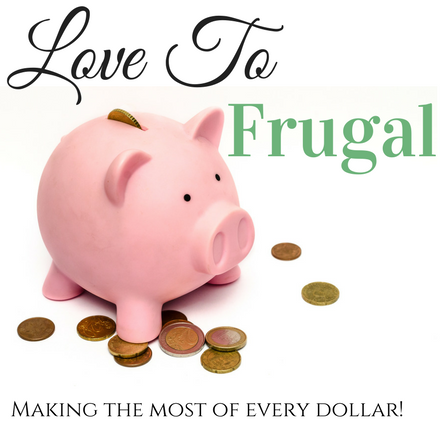
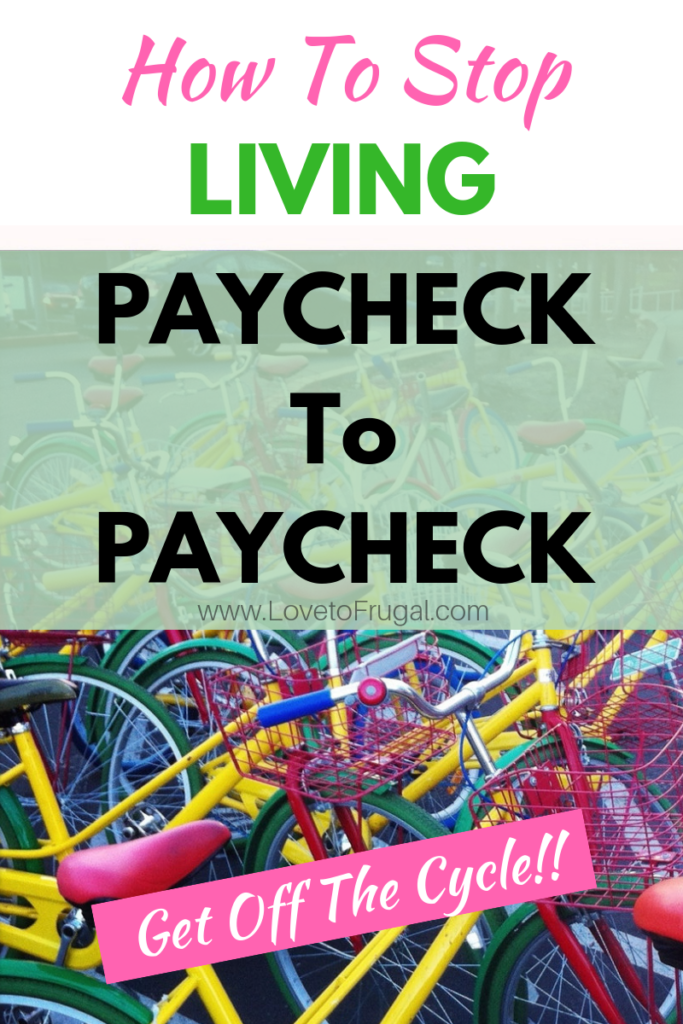



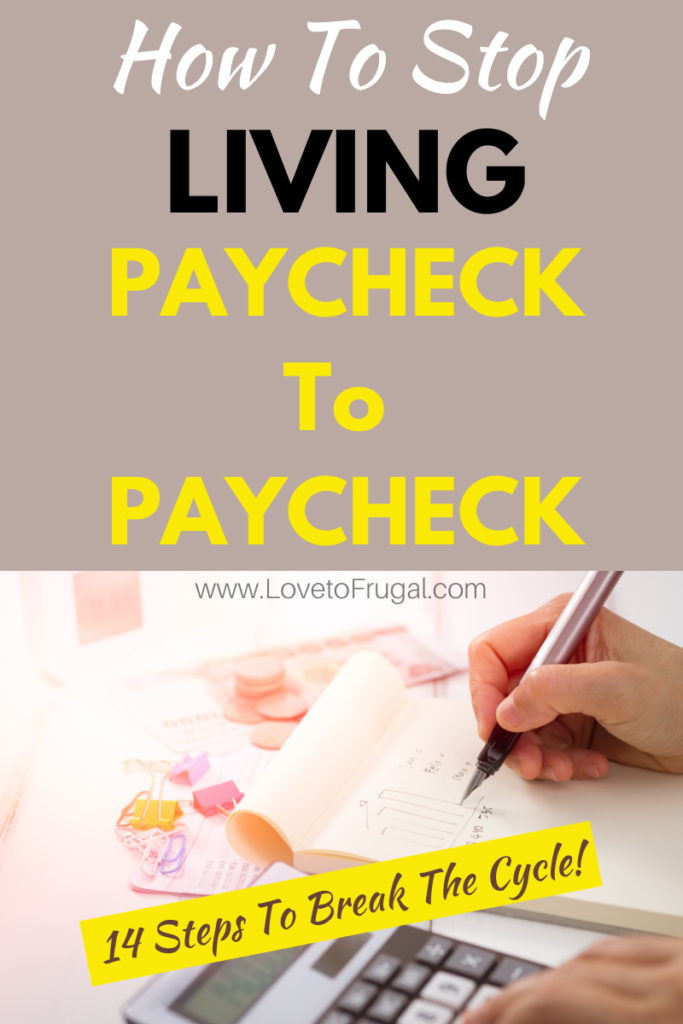
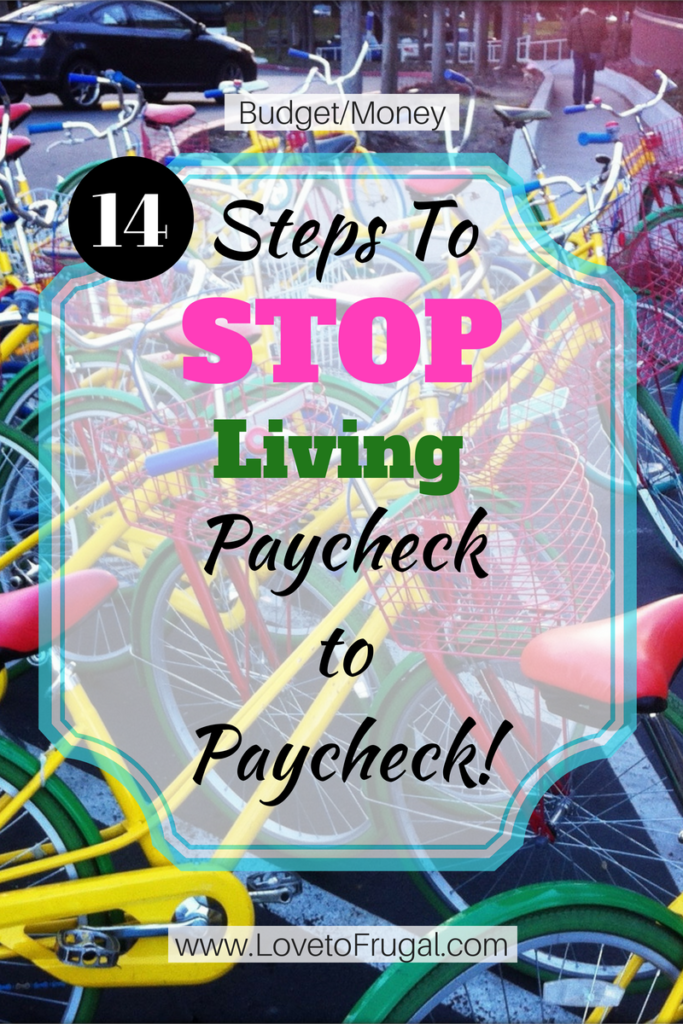
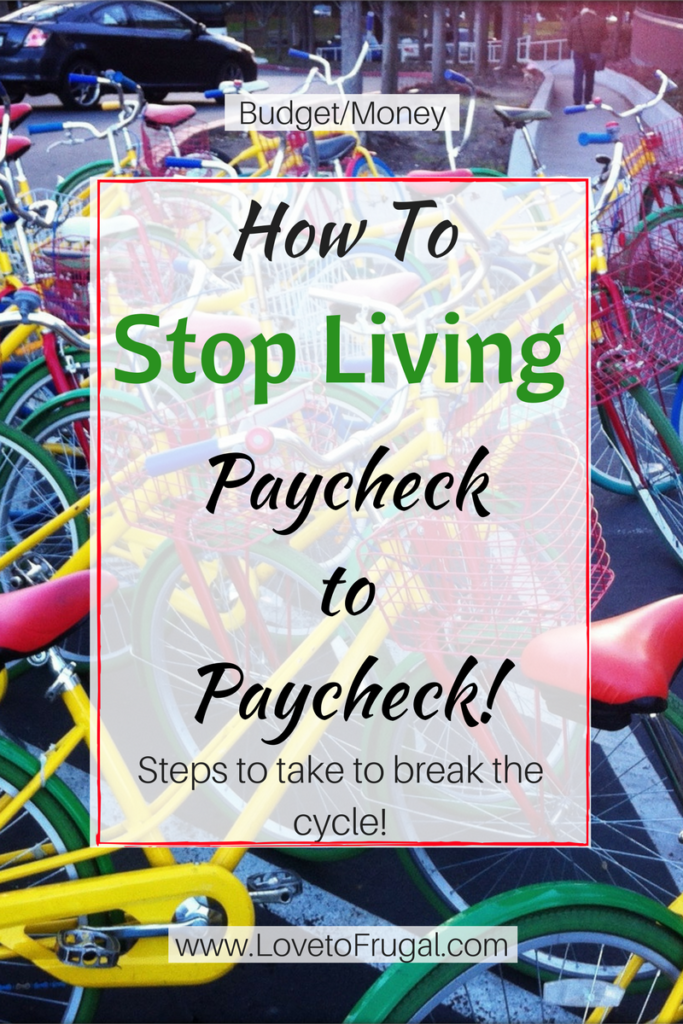
Wow! Great article. So much information in one place. I try to live by most of these suggestions. The one place I am weak on is actually making a budget. My approach is more like, Don’t Spend Money! LOL But I think living below your means, as well as being realistic about what you can afford and what you truly need, are two very key elements.
Thank you, Mandy! You’re absolutely right! Those two elements are definitely key to stopping the paycheck to paycheck cycle. There’s no way to get ahead if you can’t do both. But, budgeting is also key. It takes a couple of months to get it right, but once you do, it’s freedom!
I’m so glad you enjoyed the post!
Kimberly
All excellent tips. You covered pretty all the bases that I incorporate. It’s a “feel” good feeling when you see what you accomplish Have pinned!
Hi, Deborah! You are so right! That “feel good” feeling is a sense of pride and accomplishment. It’s what keeps us moving forward! Thank you so much for pinning! It’s very appreciated!